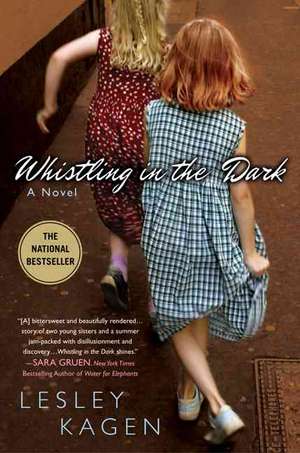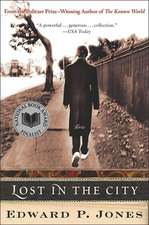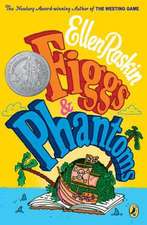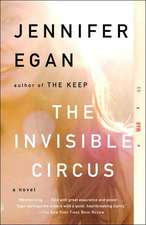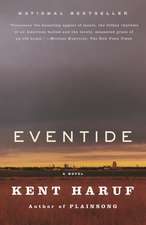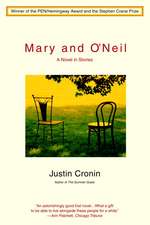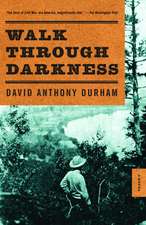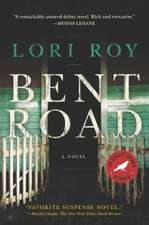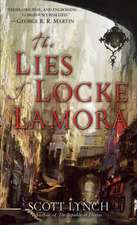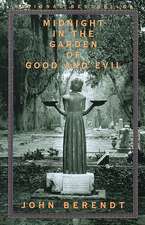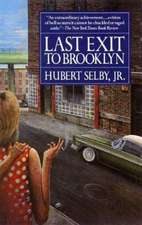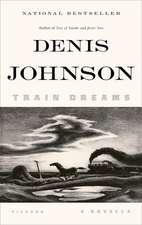Whistling in the Dark
Autor Lesley Kagenen Limba Engleză Paperback – 30 apr 2007 – vârsta de la 18 ani
Vezi toate premiile Carte premiată
Great Lakes Book Awards (2007), Midwest Booksellers' Choice Award (2008)
It was the summer on Vliet Street when we all started locking our doors...
Sally O'Malley made a promise to her daddy before he died. She swore she'd look after her sister, Troo. Keep her safe. But like her Granny always said-actions speak louder than words. Now, during the summer of 1959, the girls' mother is hospitalized, their stepfather has abandoned them for a six pack, and their big sister, Nell, is too busy making out with her boyfriend to notice that Sally and Troo are on the Loose. And so is a murderer and molester.
Highly imaginative Sally is pretty sure of two things. Who the killer is. And that she's next on his list. Now she has no choice but to protect herself and Troo as best she can, relying on her own courage and the kindness of her neighbors.
Sally O'Malley made a promise to her daddy before he died. She swore she'd look after her sister, Troo. Keep her safe. But like her Granny always said-actions speak louder than words. Now, during the summer of 1959, the girls' mother is hospitalized, their stepfather has abandoned them for a six pack, and their big sister, Nell, is too busy making out with her boyfriend to notice that Sally and Troo are on the Loose. And so is a murderer and molester.
Highly imaginative Sally is pretty sure of two things. Who the killer is. And that she's next on his list. Now she has no choice but to protect herself and Troo as best she can, relying on her own courage and the kindness of her neighbors.
Preț: 124.09 lei
Nou
Puncte Express: 186
Preț estimativ în valută:
23.74€ • 24.88$ • 19.63£
23.74€ • 24.88$ • 19.63£
Carte disponibilă
Livrare economică 22 martie-05 aprilie
Preluare comenzi: 021 569.72.76
Specificații
ISBN-13: 9780451221230
ISBN-10: 0451221230
Pagini: 297
Dimensiuni: 139 x 204 x 18 mm
Greutate: 0.28 kg
Editura: NAL Accent
ISBN-10: 0451221230
Pagini: 297
Dimensiuni: 139 x 204 x 18 mm
Greutate: 0.28 kg
Editura: NAL Accent
Notă biografică
Lesley Kagen is an actress, voice-over talent, and restaurateur, as well as the author of two previous national bestselling novels. Whistling in the Dark has been translated into five languages and was a Midwest Choice Honor winner. Land of a Hundred Wonders, an Indie Next pick, was also nominated for a Midwest Choice Award. She lives near Milwaukee, Wisconsin.
Extras
Chapter One The morning Mother told us she was sick, Troo and me were just laying in the lime summer grass, smelling the bleach comin’ off the wash that jitterbugged on the line and getting ready to play that name game with her. “It’s important for you to understand who you’re dealing with so you can know what to expect from them,” Mother said, pulling another sheet out of the laundry basket. “You’ve got to remember that people are different in the city.”
How could we forget? She musta told us this over a gabillion times since we moved to the house on Vliet Street. We were a mother and her three girls. And I supposed I had to count Hall, because that would be the charitable thing to do. Hall was Mother’s husband. Her third husband.
Troo and me, we liked our own daddy better than Hall, but he died two summers ago after a car crash. He was on his way back home to the farm after a Milwaukee Braves game. Our uncle Paulie, who was riding shotgun, went through the windshield and got his brain damaged when he hit a fire hydrant so he had to go live with my Granny over on Fifty- ninth Street. Some man at his funeral called our daddy, Donny O’Malley, lush. I didn’t know what that meant so I looked it up the next day in that big dictionary they had over at the library. Lush is an adjective that means luxurious. That man was right. My daddy was lush. Stuffed with lushness. Like a chocolate cake with chocolate filling and chocolate frosting.
Mother shook out the wet white sheet and said, “And one of the ways you can know what to expect from somebody is by knowing what country they originally came from. Right? People’s last names can tell you just about everything you’ll ever need to know about them.”
Troo and me groaned because the name game was gettin’ kinda old and was about as much fun as a splinter under your thumbnail, but Mother, she loved this name game even better than Chinese checkers.
“I don’t have all day.” Mother gave us her do- you- smelldog- poop look, so Troo called out “Latour?” real quick.
Troo was gorgeous- looking. Red wavy hair that stopped at her shoulders and freckles across her nose only. And she had the kind of blue eyes that looked like the sky when it just woke up in the morning and hadn’t turned that blue jean color it got later on in the day. Troo was thin except at her lips, which were poofy and made her look a little pouty all the time, which was true some of the time. And she had long fi ngers, which were good for playing the secondhand piano we had in the living room. Mother thought pianos made a family look high- class. Granny told me that piano business was a little stuck- up of her daughter since Mother grew up in Milwaukee just a few streets down from where we lived now. Right across the street from the Feelin’ Good Cookie Factory, which was known far and wide for its chocolate chip cookies. (What Granny really said, because she was always sayin’ stuff like this, was, “Helen should know by now that she can’t make a silk purse out of a sow’s ear.”)
Mother cupped her hand around her ear, so Troo yelled louder, “Latour?”
Helen and Troo. “Two peas in a pod,” Granny also always said. “Just look at ’em.”
I didn’t look like Troo. Or Mother. My eyes weren’t blue like theirs. Mine were green and they sat under eyebrows that were almost invisible to the naked eye but had some bulkiness to them. I was not as tall as Troo even though she was younger than me. I had long legs but small feet and hands because I was born a month early. And I had no freckles on my face. Not one. But I had been told once or twice that I had darling dimples and nice thick blonde hair that Mother and Nell got in an argument over every morning when they tried to put it into one fat braid that went down my back. Nell was my other sister. But only a half of one. Nell’s father was Mother’s first husband, who she told me died of smelling ammonia.
Mother answered, “Latour is French.” She took a little whiff of her wrist that I knew would smell like Evening in Paris, her favorite. “The French speak the language of love.”
Troo wasn’t even paying attention. She was lookin’ over at our next- door neighbor’s house and wondering if the stories we’d been hearing about the place were true. Because we were sisters born only ten months apart, which made us practically twins, her and me could have the mental telepathy that lets you read somebody else’s mind even if they don’t want you to, so I pretty much always knew what Troo was thinking. “Kenfield?” she hollered out.
“Kenfield is English,” Mother said. “They like to keep a stiff upper lip. That means they don’t like to show what they’re feeling.” She bent down to take another sheet out of the basket, and when she did her hair came undone from the white ribbon. I was always surprised by how long it was. And when the sun shined on it, even though it was red, you could see the gold hiding in it. I thought she was more beautiful than the movie star Maureen O’Hara. And so must the men on the block because they set their beer bottles down when she walked by and sometimes, if those beer bottles were all drunk up, they gave her a low wolf whistle she pretended not to hear.
Troo nudged me with her elbow and started giggling. “O’Malley.”
Mother shook her finger and said, “Troo O’Malley, being silly never got anybody anywhere in life.” But the corners of her mouth went up just a smidge to let us know that we were better than everybody else and not just potato heads or micks, as the kids on the block who were Italian and Polish and German liked to call us. We called them wops (loud, but great cooks) and Polacks (not so smart) and bohunks (thick- ankled), so I figured it all came out in the wash.
Somebody down the block yelled, “Ollie, Ollie, oxen free,” and Little Richard singing “Tutti Frutti” drifted by out of a car radio. That’s how it was on Vliet Street. Something lively was always going on. Except for dead Junie Piaskowski, who everyone on the block said was murdered and molested. Sara Heinemann hadn’t been murdered and molested yet when Mother fastened the last clothespin on the line and said, “O’Malley sisters, come over here. I have something to tell you.”
Of course, I let Troo sit next to Mother on the stone bench near the pink peony flowers that were falling all over themselves because I made my daddy a couple of promises before he died. And if there is one thing you’re gonna get to know about me, it’s that I was a girl who wouldn’t break a promise even if her life depended on it.
Right when the sun was going behind the trees, Daddy made everybody else go out of the hospital room and asked me to come lie down next to him in his bed that he could make go up and down whenever he wanted.
“Sally?” He had all these tubes coming out of him. And next to him was a machine that ping ping pinged just like the submarine in that movie Troo and me had seen at the Uptown Theater called 20,000 Leagues Under the Sea.
“Yes, Daddy?” He didn’t look so much like himself anymore. His face was swelled up and he had cuts around his mouth and bits of blood that didn’t seem to wash off. Also he had a big purple circle bruise from the steering wheel going into his chest. Something had collapsed in there, the old nurse said. “You need to take care of Troo,” Daddy said ever so quietly. His usually fluffy red- as- a-pile- of- fall- leaves hair came into points on his forehead. “You need to promise me that.”
I patted his hand that felt smooth because the old nurse had just put some cream on it. “I promise. I’ll take care of Troo. Cross my heart. But I gotta tell you something really important, I’m—”
“You have to tell Troo for me that it’s okay,” Daddy interrupted. “Tell her the crash wasn’t her fault.”
Troo was in the hospital too, down the hall from Daddy, because she was also in the car when it ran into that big elm tree on Holly Road. Since she was sitting in the backseat, she didn’t get as hurt as Daddy or Uncle Paulie. She just got a broken arm that ached sometimes now before it was gonna rain.
Daddy took in a breath like it was the hardest thing he’d ever done, and when he let it out he said, “And tell your mother that I forgive her for what she did. Promise?” Then he started coughing some more and a little pink spit came up onto his lips. “I’ll be watching, Sally. Remember . . . things can happen when you least expect them so you always gotta be prepared. And pay attention to the details. The de vil is in the details.” Then Daddy went to sleep for a minute but woke up again and said, “And Nell is not the worst big sister in the world. There are one or two that’re worse.”
The old nurse came back into the room then and said Daddy was either delirious or hilarious. I couldn’t quite catch it because she had a funny way of talking.
Troo’s fault that Daddy was in the hospital? How could all this be Troo’s fault? Troo couldn’t drive a car, she was only seven years old! Oh, Daddy. And I had no idea what he wanted to forgive Mother for and why he couldn’t tell her himself, but maybe it was because she was crazy with grief like the doctor said.
Even though Daddy had fallen asleep, I whispered, “Roger, wilco and out.” That’s how we always said good- bye to each other. Just like Penny said good- bye to her uncle Sky King when he was up in the clear blue of the western sky in his plane the Songbird. Daddy and me just adored that TV show, watched it together every single Saturday morning because Daddy was a pilot, too.
And then the old nurse said, “Visiting hours are over.” “But I gotta…,” I tried to say, but she shook her head in a way that I knew there’d be no gettin’ around. What I wanted to tell him would have to wait until tomorrow. I put my hand on his whiskery chin and turned his face toward mine so I could give him a butterfly kiss on his cheek, because that was his absolute favorite, and then an Eskimo kiss on his nose because that was my absolute favorite.
Daddy’s funeral was three days after I made him those promises. I never did get to tell him I was sorry.
How could we forget? She musta told us this over a gabillion times since we moved to the house on Vliet Street. We were a mother and her three girls. And I supposed I had to count Hall, because that would be the charitable thing to do. Hall was Mother’s husband. Her third husband.
Troo and me, we liked our own daddy better than Hall, but he died two summers ago after a car crash. He was on his way back home to the farm after a Milwaukee Braves game. Our uncle Paulie, who was riding shotgun, went through the windshield and got his brain damaged when he hit a fire hydrant so he had to go live with my Granny over on Fifty- ninth Street. Some man at his funeral called our daddy, Donny O’Malley, lush. I didn’t know what that meant so I looked it up the next day in that big dictionary they had over at the library. Lush is an adjective that means luxurious. That man was right. My daddy was lush. Stuffed with lushness. Like a chocolate cake with chocolate filling and chocolate frosting.
Mother shook out the wet white sheet and said, “And one of the ways you can know what to expect from somebody is by knowing what country they originally came from. Right? People’s last names can tell you just about everything you’ll ever need to know about them.”
Troo and me groaned because the name game was gettin’ kinda old and was about as much fun as a splinter under your thumbnail, but Mother, she loved this name game even better than Chinese checkers.
“I don’t have all day.” Mother gave us her do- you- smelldog- poop look, so Troo called out “Latour?” real quick.
Troo was gorgeous- looking. Red wavy hair that stopped at her shoulders and freckles across her nose only. And she had the kind of blue eyes that looked like the sky when it just woke up in the morning and hadn’t turned that blue jean color it got later on in the day. Troo was thin except at her lips, which were poofy and made her look a little pouty all the time, which was true some of the time. And she had long fi ngers, which were good for playing the secondhand piano we had in the living room. Mother thought pianos made a family look high- class. Granny told me that piano business was a little stuck- up of her daughter since Mother grew up in Milwaukee just a few streets down from where we lived now. Right across the street from the Feelin’ Good Cookie Factory, which was known far and wide for its chocolate chip cookies. (What Granny really said, because she was always sayin’ stuff like this, was, “Helen should know by now that she can’t make a silk purse out of a sow’s ear.”)
Mother cupped her hand around her ear, so Troo yelled louder, “Latour?”
Helen and Troo. “Two peas in a pod,” Granny also always said. “Just look at ’em.”
I didn’t look like Troo. Or Mother. My eyes weren’t blue like theirs. Mine were green and they sat under eyebrows that were almost invisible to the naked eye but had some bulkiness to them. I was not as tall as Troo even though she was younger than me. I had long legs but small feet and hands because I was born a month early. And I had no freckles on my face. Not one. But I had been told once or twice that I had darling dimples and nice thick blonde hair that Mother and Nell got in an argument over every morning when they tried to put it into one fat braid that went down my back. Nell was my other sister. But only a half of one. Nell’s father was Mother’s first husband, who she told me died of smelling ammonia.
Mother answered, “Latour is French.” She took a little whiff of her wrist that I knew would smell like Evening in Paris, her favorite. “The French speak the language of love.”
Troo wasn’t even paying attention. She was lookin’ over at our next- door neighbor’s house and wondering if the stories we’d been hearing about the place were true. Because we were sisters born only ten months apart, which made us practically twins, her and me could have the mental telepathy that lets you read somebody else’s mind even if they don’t want you to, so I pretty much always knew what Troo was thinking. “Kenfield?” she hollered out.
“Kenfield is English,” Mother said. “They like to keep a stiff upper lip. That means they don’t like to show what they’re feeling.” She bent down to take another sheet out of the basket, and when she did her hair came undone from the white ribbon. I was always surprised by how long it was. And when the sun shined on it, even though it was red, you could see the gold hiding in it. I thought she was more beautiful than the movie star Maureen O’Hara. And so must the men on the block because they set their beer bottles down when she walked by and sometimes, if those beer bottles were all drunk up, they gave her a low wolf whistle she pretended not to hear.
Troo nudged me with her elbow and started giggling. “O’Malley.”
Mother shook her finger and said, “Troo O’Malley, being silly never got anybody anywhere in life.” But the corners of her mouth went up just a smidge to let us know that we were better than everybody else and not just potato heads or micks, as the kids on the block who were Italian and Polish and German liked to call us. We called them wops (loud, but great cooks) and Polacks (not so smart) and bohunks (thick- ankled), so I figured it all came out in the wash.
Somebody down the block yelled, “Ollie, Ollie, oxen free,” and Little Richard singing “Tutti Frutti” drifted by out of a car radio. That’s how it was on Vliet Street. Something lively was always going on. Except for dead Junie Piaskowski, who everyone on the block said was murdered and molested. Sara Heinemann hadn’t been murdered and molested yet when Mother fastened the last clothespin on the line and said, “O’Malley sisters, come over here. I have something to tell you.”
Of course, I let Troo sit next to Mother on the stone bench near the pink peony flowers that were falling all over themselves because I made my daddy a couple of promises before he died. And if there is one thing you’re gonna get to know about me, it’s that I was a girl who wouldn’t break a promise even if her life depended on it.
Right when the sun was going behind the trees, Daddy made everybody else go out of the hospital room and asked me to come lie down next to him in his bed that he could make go up and down whenever he wanted.
“Sally?” He had all these tubes coming out of him. And next to him was a machine that ping ping pinged just like the submarine in that movie Troo and me had seen at the Uptown Theater called 20,000 Leagues Under the Sea.
“Yes, Daddy?” He didn’t look so much like himself anymore. His face was swelled up and he had cuts around his mouth and bits of blood that didn’t seem to wash off. Also he had a big purple circle bruise from the steering wheel going into his chest. Something had collapsed in there, the old nurse said. “You need to take care of Troo,” Daddy said ever so quietly. His usually fluffy red- as- a-pile- of- fall- leaves hair came into points on his forehead. “You need to promise me that.”
I patted his hand that felt smooth because the old nurse had just put some cream on it. “I promise. I’ll take care of Troo. Cross my heart. But I gotta tell you something really important, I’m—”
“You have to tell Troo for me that it’s okay,” Daddy interrupted. “Tell her the crash wasn’t her fault.”
Troo was in the hospital too, down the hall from Daddy, because she was also in the car when it ran into that big elm tree on Holly Road. Since she was sitting in the backseat, she didn’t get as hurt as Daddy or Uncle Paulie. She just got a broken arm that ached sometimes now before it was gonna rain.
Daddy took in a breath like it was the hardest thing he’d ever done, and when he let it out he said, “And tell your mother that I forgive her for what she did. Promise?” Then he started coughing some more and a little pink spit came up onto his lips. “I’ll be watching, Sally. Remember . . . things can happen when you least expect them so you always gotta be prepared. And pay attention to the details. The de vil is in the details.” Then Daddy went to sleep for a minute but woke up again and said, “And Nell is not the worst big sister in the world. There are one or two that’re worse.”
The old nurse came back into the room then and said Daddy was either delirious or hilarious. I couldn’t quite catch it because she had a funny way of talking.
Troo’s fault that Daddy was in the hospital? How could all this be Troo’s fault? Troo couldn’t drive a car, she was only seven years old! Oh, Daddy. And I had no idea what he wanted to forgive Mother for and why he couldn’t tell her himself, but maybe it was because she was crazy with grief like the doctor said.
Even though Daddy had fallen asleep, I whispered, “Roger, wilco and out.” That’s how we always said good- bye to each other. Just like Penny said good- bye to her uncle Sky King when he was up in the clear blue of the western sky in his plane the Songbird. Daddy and me just adored that TV show, watched it together every single Saturday morning because Daddy was a pilot, too.
And then the old nurse said, “Visiting hours are over.” “But I gotta…,” I tried to say, but she shook her head in a way that I knew there’d be no gettin’ around. What I wanted to tell him would have to wait until tomorrow. I put my hand on his whiskery chin and turned his face toward mine so I could give him a butterfly kiss on his cheek, because that was his absolute favorite, and then an Eskimo kiss on his nose because that was my absolute favorite.
Daddy’s funeral was three days after I made him those promises. I never did get to tell him I was sorry.
Premii
- Great Lakes Book Awards Nominee, 2007
- Midwest Booksellers' Choice Award Honor Book, 2008
